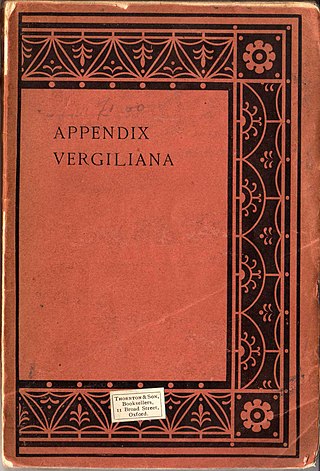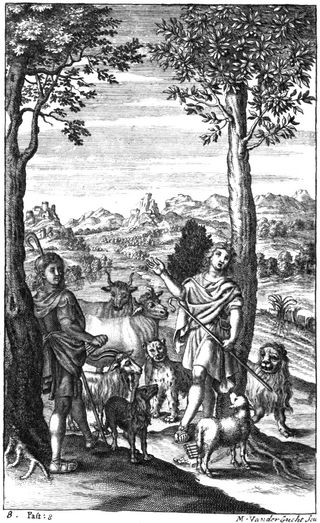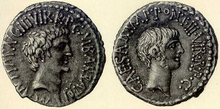
Publius Vergilius Maro, usually called Virgil or Vergil in English, was an ancient Roman poet of the Augustan period. He composed three of the most famous poems in Latin literature: the Eclogues, the Georgics, and the epic Aeneid. A number of minor poems, collected in the Appendix Vergiliana, were attributed to him in ancient times, but modern scholars consider his authorship of these poems to be dubious.

An acrostic is a poem or other word composition in which the first letter of each new line spells out a word, message or the alphabet. The term comes from the French acrostiche from post-classical Latin acrostichis, from Koine Greek ἀκροστιχίς, from Ancient Greek ἄκρος "highest, topmost" and στίχος "verse". As a form of constrained writing, an acrostic can be used as a mnemonic device to aid memory retrieval. When the last letter of each new line forms a word it is called a telestich; the combination of an acrostic and a telestich in the same composition is called a double acrostic.

The Georgics is a poem by Latin poet Virgil, likely published in 29 BCE. As the name suggests the subject of the poem is agriculture; but far from being an example of peaceful rural poetry, it is a work characterized by tensions in both theme and purpose.

The Eclogues, also called the Bucolics, is the first of the three major works of the Latin poet Virgil.

The Appendix Vergiliana is a collection of Latin poems traditionally ascribed as being the juvenilia of Virgil.

Alfenus Varus was an ancient Roman jurist and writer who lived around the 1st century BC.

Eclogue4, also known as the FourthEclogue, is a Latin poem by the Roman poet Virgil. The poem is dated to 40 BC by its mention of the consulship of Virgil's patron Gaius Asinius Pollio.

Eclogue 4, also known as the Fourth Eclogue, is the name of a Latin poem by the Roman poet Virgil. Part of his first major work, the Eclogues, the piece was written around 40 BC, during a time of brief stability following the Treaty of Brundisium; it was later published in and around the years 39–38 BC. The work describes the birth of a boy, a supposed savior, who once of age will become divine and eventually rule over the world. During late antiquity and the Middle Ages, a desire emerged to view Virgil as a virtuous pagan, and as such the early Christian theologian Lactantius, and St. Augustine—to varying degrees—reinterpreted the poem to be about the birth of Jesus Christ.
The Eclogues is a book of four Latin poems, attributed to Marcus Aurelius Olympius Nemesianus.
The Einsiedeln Eclogues are two Latin pastoral poems, written in hexameters. They were discovered in a tenth century manuscript from Einsiedeln Abbey and first published in 1869, by H. Hagen.

Sleeping Silenus is a bronze relief by Flemish sculptor François Duquesnoy. The original relief in marble was completed by Duquesnoy in the early 17th century. The original Sleeping Silenus is known today only through copies. A well-preserved version in bronze is currently housed at Rubenshuis in Antwerp.

Eclogue 1 is a bucolic poem by the Latin poet Virgil from his Eclogues. In this poem, which is in the form of a dialogue, Virgil contrasts the diverse fortunes of two farmers, Tityrus, an old man whose lands and liberty have been restored to him thanks to the intervention of an unnamed young man, and Meliboeus, who has been forced off his land, which is due to be given to a soldier. It is generally assumed that the poem refers to the confiscations of land that took place around Virgil's home town of Mantua in 41 BC in order to settle retired soldiers after the civil war. The poem has 83 lines, and is written in the dactylic hexameter metre.

Eclogue 2 is a pastoral poem by the Latin poet Virgil, one of a series of ten poems known as the Eclogues. In this Eclogue the herdsman Corydon laments his inability to win the affections of the young Alexis. It is an imitation of the eleventh Idyll of Theocritus, in which the Cyclops Polyphemus laments the cruelty of the sea-nymph Galatea. After a 5-line introduction, the rest of the poem consists of a single speech by Corydon. The poem has 73 lines, and is written in the dactylic hexameter metre.

Eclogue 3 is a pastoral poem by the Latin poet Virgil, one of a collection of ten poems known as the "Eclogues". This eclogue represents the rivalry in song of two herdsmen, Menalcas and Damoetas. After trading insults, the two men decide to have a singing competition, for which each offers a prize. A neighbour, Palaemon, who comes along by chance, agrees to be the judge. The second half of the poem consists of the contest, in which each of the two competitors in turn sings a couplet and the other caps it with another couplet. In the end Palaemon brings the contest to an end and declares it a draw.
Eclogue 5 is a pastoral poem by the Latin poet Virgil, one of his book of ten poems known as the Eclogues. In form, this is an expansion of the first Idyll of Theocritus, which contains a song about the death of the semi-divine herdsman Daphnis. In the first half of Virgil's poem, the goatherd Mopsus sings a song lamenting the death of Daphnis; in the second half, his friend Menalcas sings a song of equal length telling of Daphnis' welcome among the gods, and the rites paid to him as a divinity.
Eclogue 7 is a poem by the Latin poet Virgil, one of his book of ten pastoral poems known as the Eclogues. It is an amoebaean poem in which a herdsman Meliboeus recounts a contest between the shepherd Thyrsis and the goatherd Corydon.

Eclogue 8, also titled Pharmaceutria, is a pastoral poem by the Latin poet Virgil, one of his book of ten Eclogues. After an introduction, containing an address to an unnamed dedicatee, there follow two love songs of equal length sung by two herdsmen, Damon and Alphesiboeus. One is the song of a love-sick young man, whose girlfriend Nysa is marrying another man, Mopsus. The second is the song of a woman who, with the help of her servant Amaryllis, is performing a magic rite to try to entice her beloved Daphnis back from the city.

Eclogue 9 is a pastoral poem by the Latin poet Virgil, one of his series of ten poems known as the Eclogues. This eclogue describes the meeting of two countrymen Lycidas and Moeris. Moeris has been turned out of his farm and is taking some kid goats to town for the new occupant; young Lycidas is astonished, for he had heard that Menalcas had secured the safety of the district by his poetry, but Moeris replies that, so far from that being so, he and Menalcas himself had barely escaped with their lives: they then proceed to recall passages of Menalcas' poetry. Lycidas wants to continue singing to lighten the journey but the distressed Moeris begs him to cease, promising that they will sing again when Menalcas returns.
Eclogue 10 is a pastoral poem by the Latin poet Virgil, the last of his book of ten poems known as the Eclogues written approximately 42–39 BC. The tenth Eclogue describes how Cornelius Gallus, a Roman officer on active service, having been jilted by his girlfriend Lycoris, is imagined as an Arcadian shepherd, and either bewails his lot or seeks distraction in hunting "with the Nymphs" amid "Parthenian glades" and "hurling Cydonian arrows from a Parthian bow".
Tibullus book 2 is a collection of six Latin poems written in elegiac couplets by the poet Albius Tibullus. They are thought to have been written in the years shortly before Tibullus's death in c. 19 BC.













